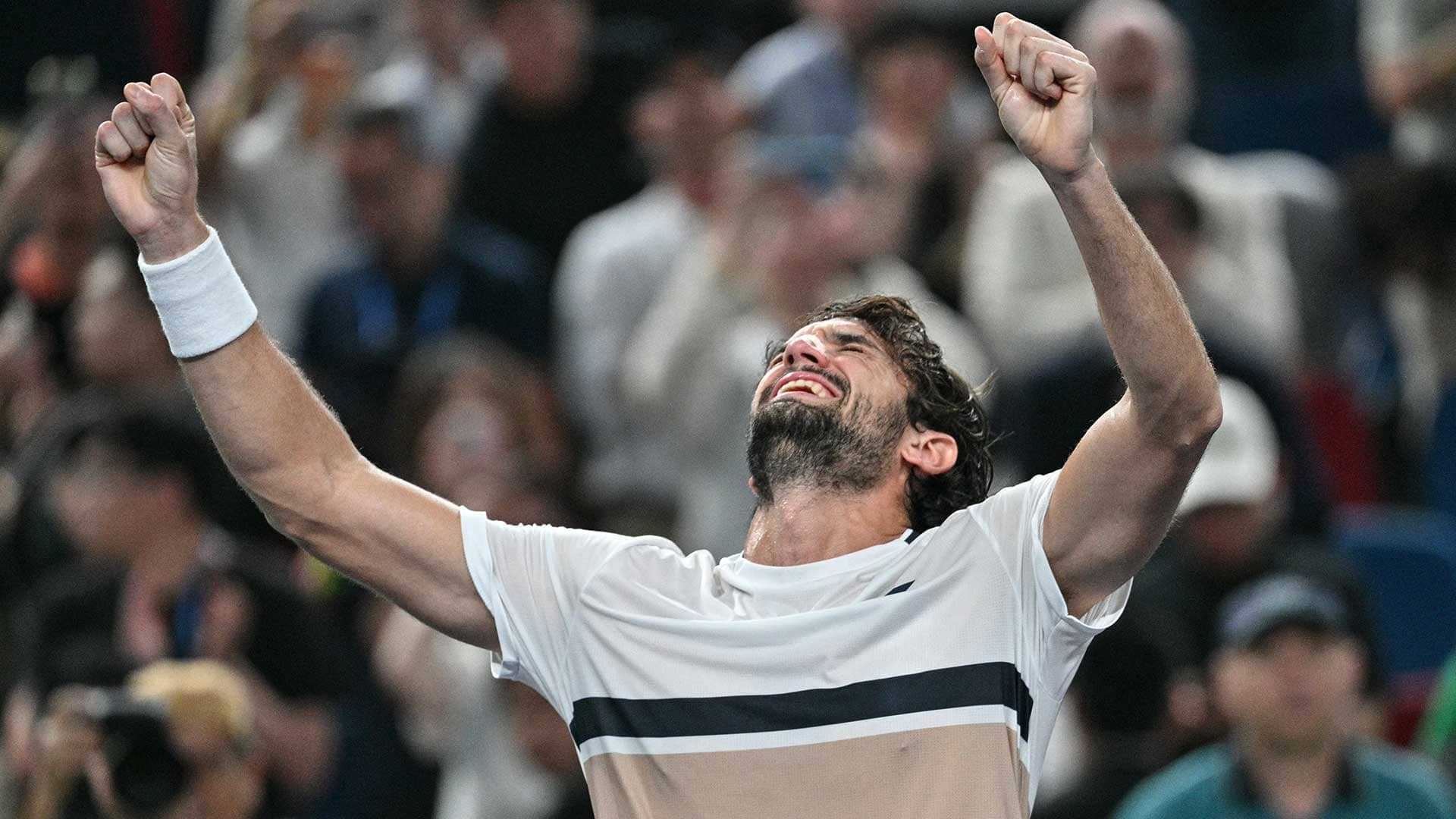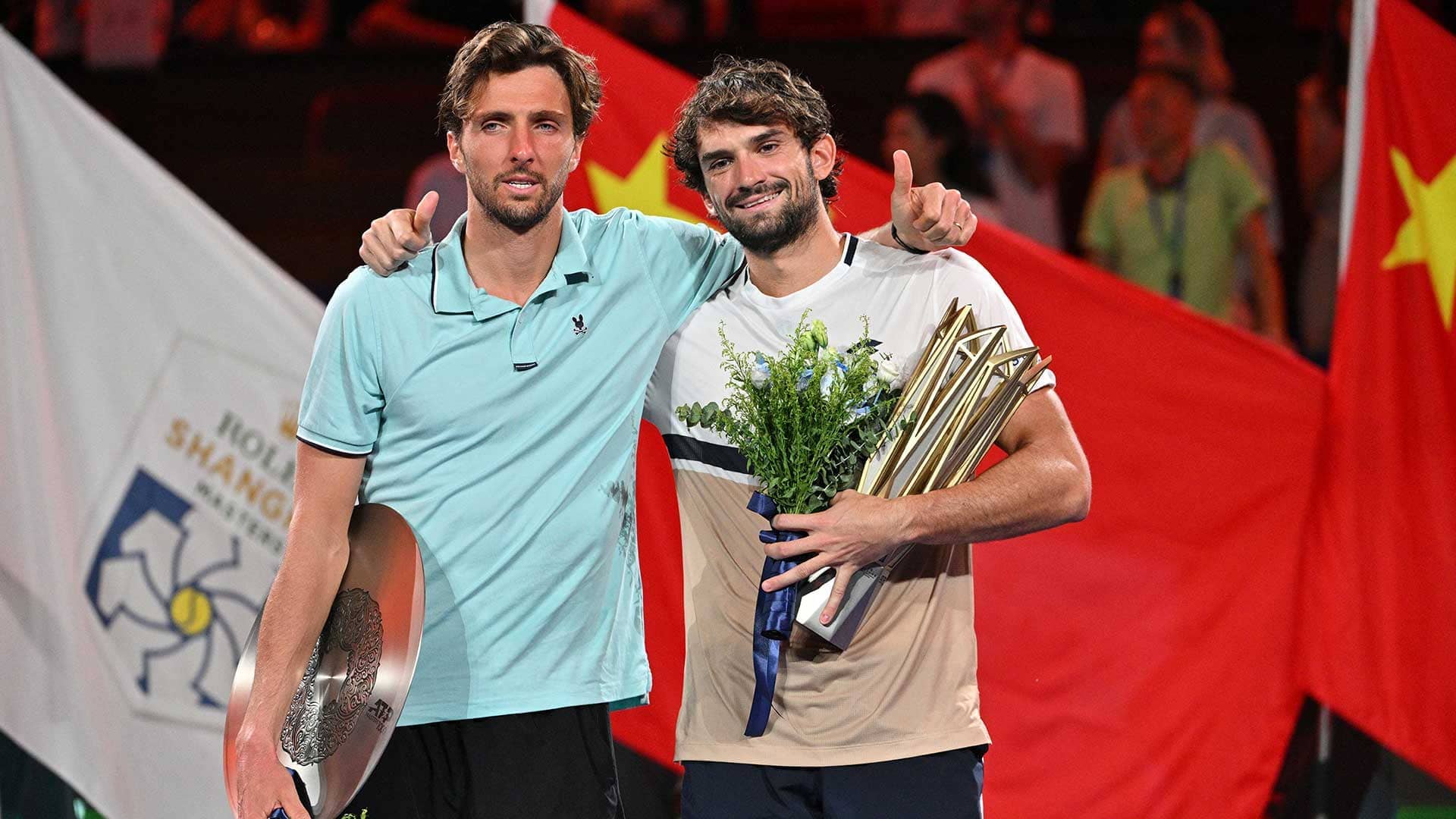
Sunday flipped the tennis script. In a season defined by familiar champions, a new story took centre stage: world No. 204 Valentin Vacherot won a Masters 1000 title — defeating Novak Djokovic and outlasting his own cousin, ranked 150 places above him. While Arthur Rinderknech’s road to the final had been a battle through tennis’s toughest names, it was Vacherot’s composure, grit, and belief that carried him to glory. His reward? A $1.125.000 cheque and a leap to world No. 40 — the kind of rise that just doesn’t happen, yet it did.
On the eve of the final, it was all smiles and embraces between the cousins. Rinderknech even declared that Sunday, whatever the result, would have ‘two winners’. But once the cousins stepped onto the court at the Qizhong Forest Sports City Arena, emotions were slowly turning into a survival instinct: only one could reign. Earlier that morning, they’d trained side by side, sharing laughs and stealing the cameras in a moment that now feels almost poetic.
So once play began, the pleasantries vanished. Both men locked in, relying on what they knew best — their game, their instincts, their fight. The opening set belonged to Rinderknech. He carried the same authority that had seen him past Zverev, Auger-Aliassime and Medvedev, breaking his cousin’s serve early and blending power with variety — crisp forehands, clever slices and timely ventures to the net. He sealed it 6–4 with a thunderous ace in what felt, for a moment, like the elder cousin’s story to write.
What followed was a masterclass in resilience and nerve. In the second set, Vacherot faced a more cautious Rinderknech — one focused on closing points quickly rather than risking long rallies with his younger cousin. Serving first, Vacherot kept the scoreboard pressure on, forcing Rinderknech to hold his nerve with every game. At 3–3, tension crept in. One break could decide it all, and Vacherot was stepping on thin ice. Yet he secured his serve and now, he had to break his cousin’s serve. He unleashed a clean backhand winner to break him, and shifted the match. From that moment onwards, the Monegasque took control, sealing the set 6–3 and igniting a comeback worthy of the occasion.
The third set had Vacherot’s momentum written all over it. Rinderknech’s missed opportunity in the second left the door wide open and his younger cousin charged through it — playing as if this truly were the biggest match of his life. Vacherot broke early, seizing both the scoreboard and the psychological edge. What followed was tennis at its most fluid: fearless rallies, bold winners and the kind of back-and-forths only family can bring to competition. Yet at 5–3, serving to stay in the match, Rinderknech faced the coup de grâce. Down 30–40, he rushed the net behind a searing forehand, only for Vacherot to answer with a perfectly timed passing shot down the line — unreachable, emphatic, and final.
What followed were tears of joy for the Monegasque and a heartbreak for a beaten, energy-wiped Frenchman. The cousins met at the heart of the court in an embrace that said everything words couldn’t. In that moment, tennis gained more than a new champion; it gained a rare story — one of family, rivalry and the grace of sport at its most human.

It was a defining day for tennis — one that broke the usual script. The familiar dominance of Sinner, Alcaraz, and Djokovic faded into silence, leaving space for a different kind of story. This was a day to celebrate the heartbeat of the sport: the players who travel the world chasing progress, testing themselves week after week beneath the glare reserved for the elite. The 2025 Shanghai Masters will be remembered as the tournament that gave us a family affair between two outsiders — a quiet rebellion against hierarchy and a rare moment of tennis redistributing its glory to those who’ve long played in its shadows.
At the trophy ceremony, Rinderknech could barely find the words — or the energy — to describe what this final had meant for him and his family. Who could have imagined they’d meet across the net on such a stage? Or that the younger cousin would triumph and leap to world No. 40? Not even their families dared to dream it. Stories like this come once in a decade. And for those who tuned in on Sunday found a rare kind of magic: a fairytale of underdog effort and kinship. One that still feels rare amid the beautiful brutality of this sport.



